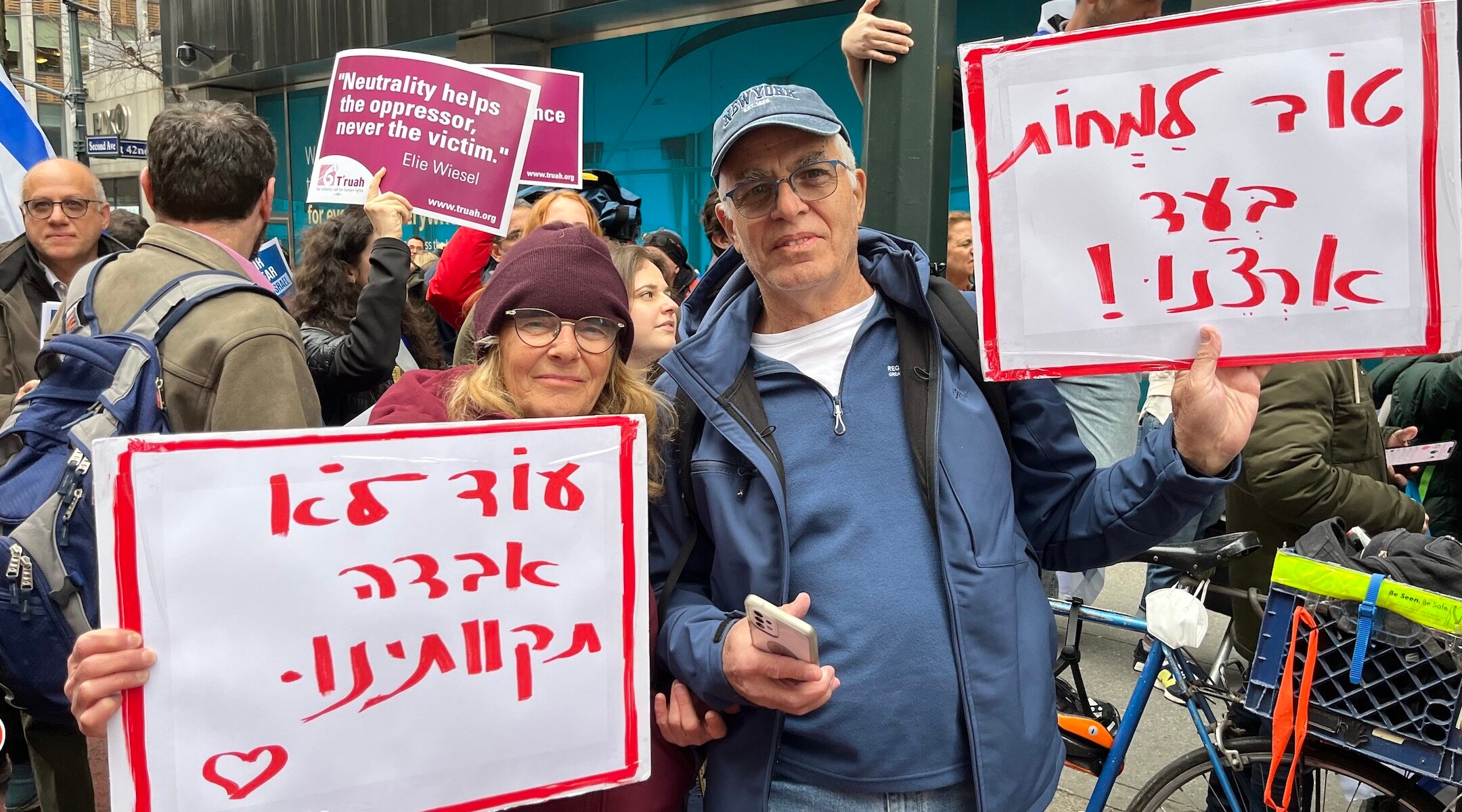(New York Jewish Week) – Hundreds of people gathered in front of the Israeli consulate in New York yesterday to stand in solidarity with Israelis who have been protesting Prime Minister Benjamin Netanyahu’s proposed changes to Israel’s judiciary, mere hours after a delay in the reforms was announced.
The protesters, who assembled on Second Avenue between 42nd and 43rd Streets, carried Israeli flags, sang Hebrew songs and chanted “Democracy will stand” in between music and speeches from local rabbis and political leaders.
The rally was held the day after Asaf Zamir, the Israeli Consul General in New York, resigned, following Netanyahu’s firing of Israel’s defense minister, Yoav Gallant. “The past 18 months as Israel’s Consul General in New York were fulfilling and rewarding, but following today’s developments, it is now time for me to join the fight for Israel’s future to ensure it remains a beacon of democracy and freedom in the world,” Zamir said in his resignation letter, which was posted to social media.
A majority of the crowd were Israelis living in New York, though cohorts from Park Slope’s Congregation Beth Elohim and supporters of T’ruah, The Rabbinic Call for Human Rights, also showed up.
For Israelis, even those who have immigrated to New York, the moment is a crucial one: Even though the legislation has been put on hold until May at the earliest, it was important to many in the crowd to nonetheless make their voices heard. Attending protests in New York is an opportunity to both show solidarity with friends and family in Israel, some said, as well as impart a sense of urgency on American Jews.
The New York Jewish Week spoke to some of the protesters about what inspired them to protest Israel’s government in New York on a rainy Monday afternoon:
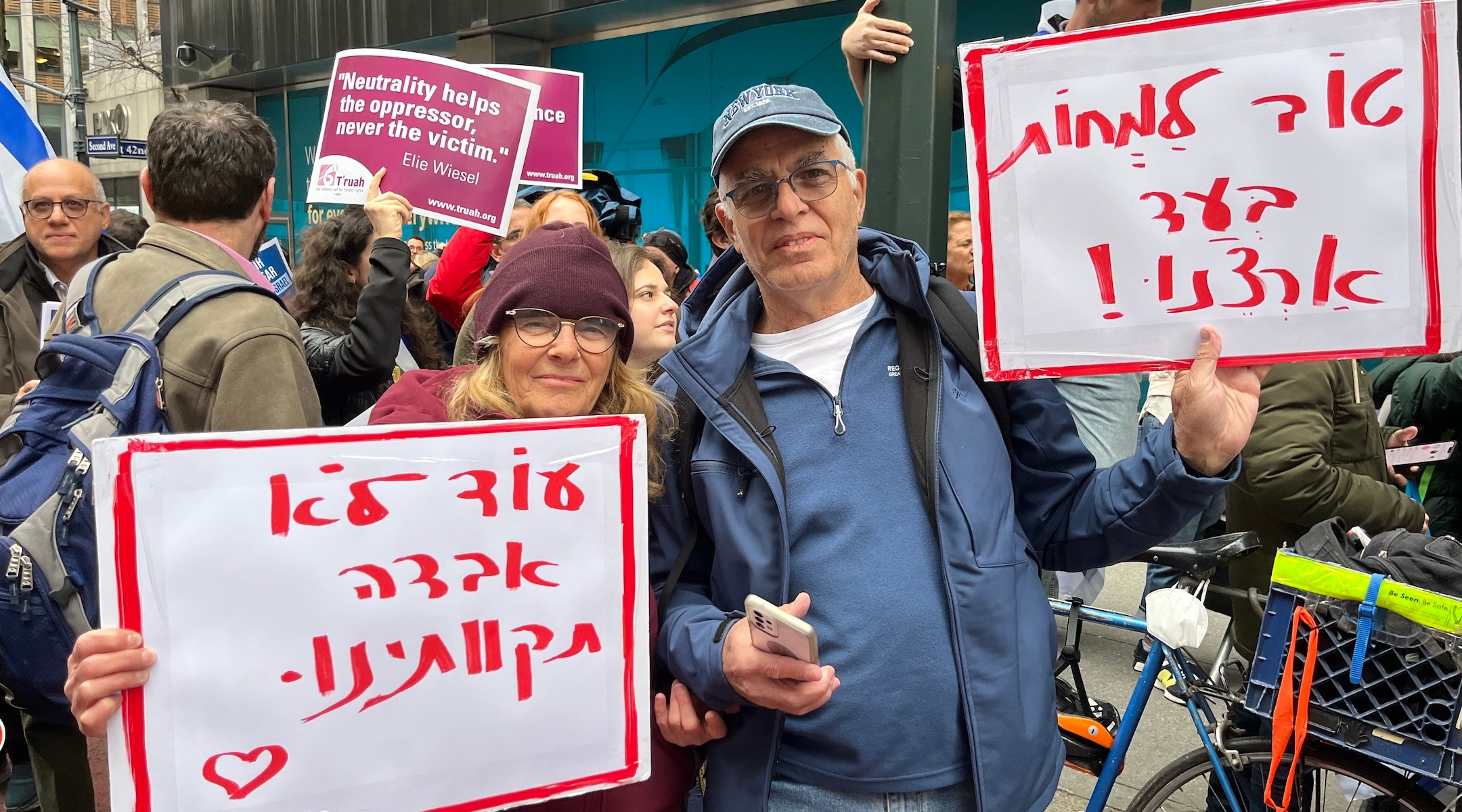
Israel and Hanana are a couple doing a housing exchange in New York. (Julia Gergely)
Israel and Hanana, who declined to provide their last names, are Israelis who have been living in New York for the last year doing a housing exchange with an American family. “We are concerned about what is happening,” Israel said. “It’s disturbing and the country is turning into a dictatorship.”
The couple has not hashed out their plan for when their housing exchange ends. Israel feels that he has to go back to his country. As for Hanana, “I don’t want to go back,” she said. “I can’t live in a dictatorship.” She would like to move to somewhere like Greece or Cyprus, she said.
Hanana carried a Hebrew sign that read “Our hope is not yet lost,” a line from the Israeli national anthem. Israel’s sign read “It’s good to protest for your country,” which is a play on the Hebrew phrase, “It’s good to die for your country,” allegedly said by a Zionist activist who died defending a Jewish settlement in Palestine in 1920.
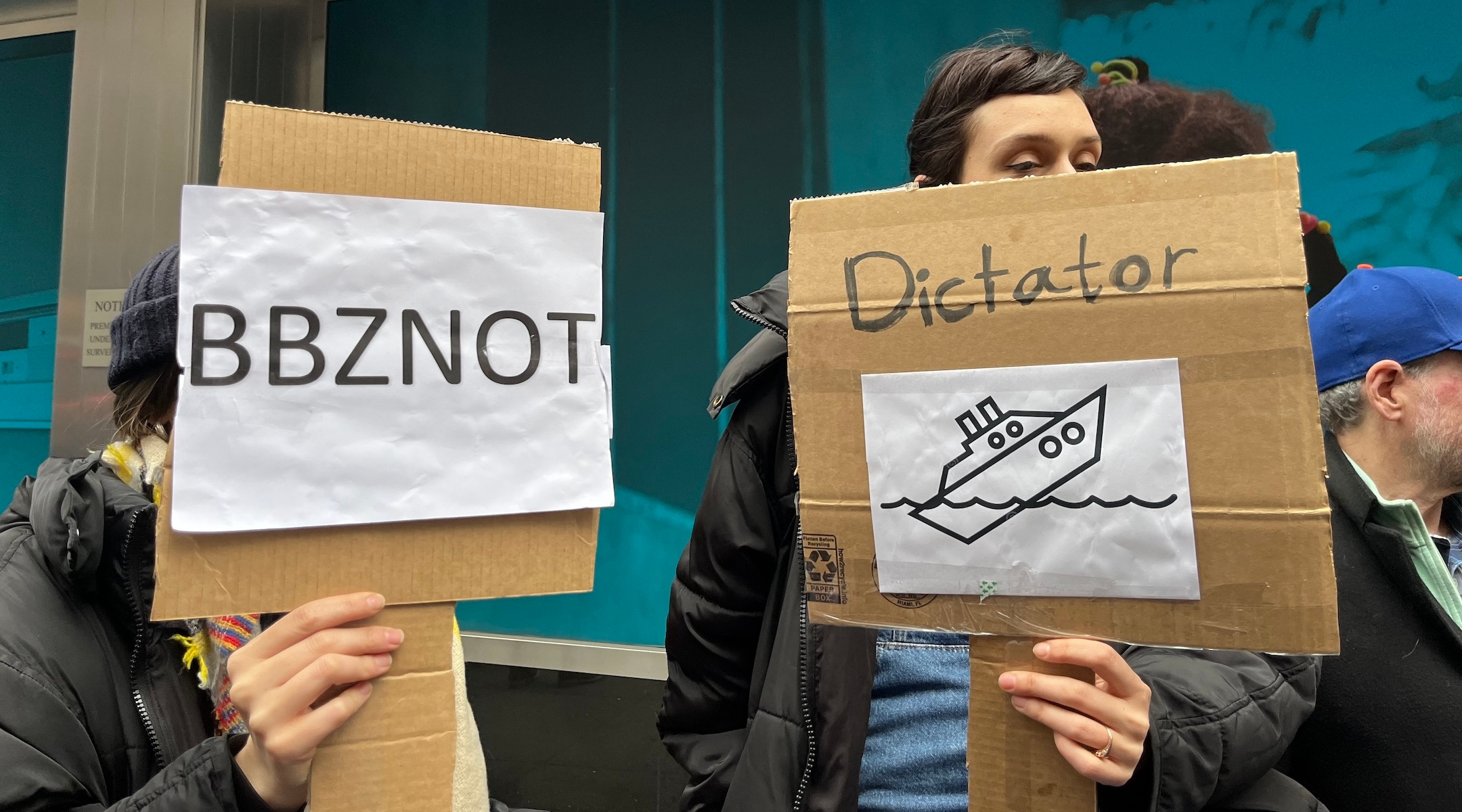
Lior and Shiran, Israelis who moved to New York 18 months ago, hold signs protesting Prime Minister Netanyahu. (Julia Gergely)
Shiran and Lior, who declined to provide their last names, have been in the United States for a year and half. Last week, they visited friends in Israel but didn’t have time to attend protests, so it was important to them to make their voices heard in New York. “We are married, so for us this has been a really big deal,” Shiran said. At this point, they are planning to stay in New York for good, they said.
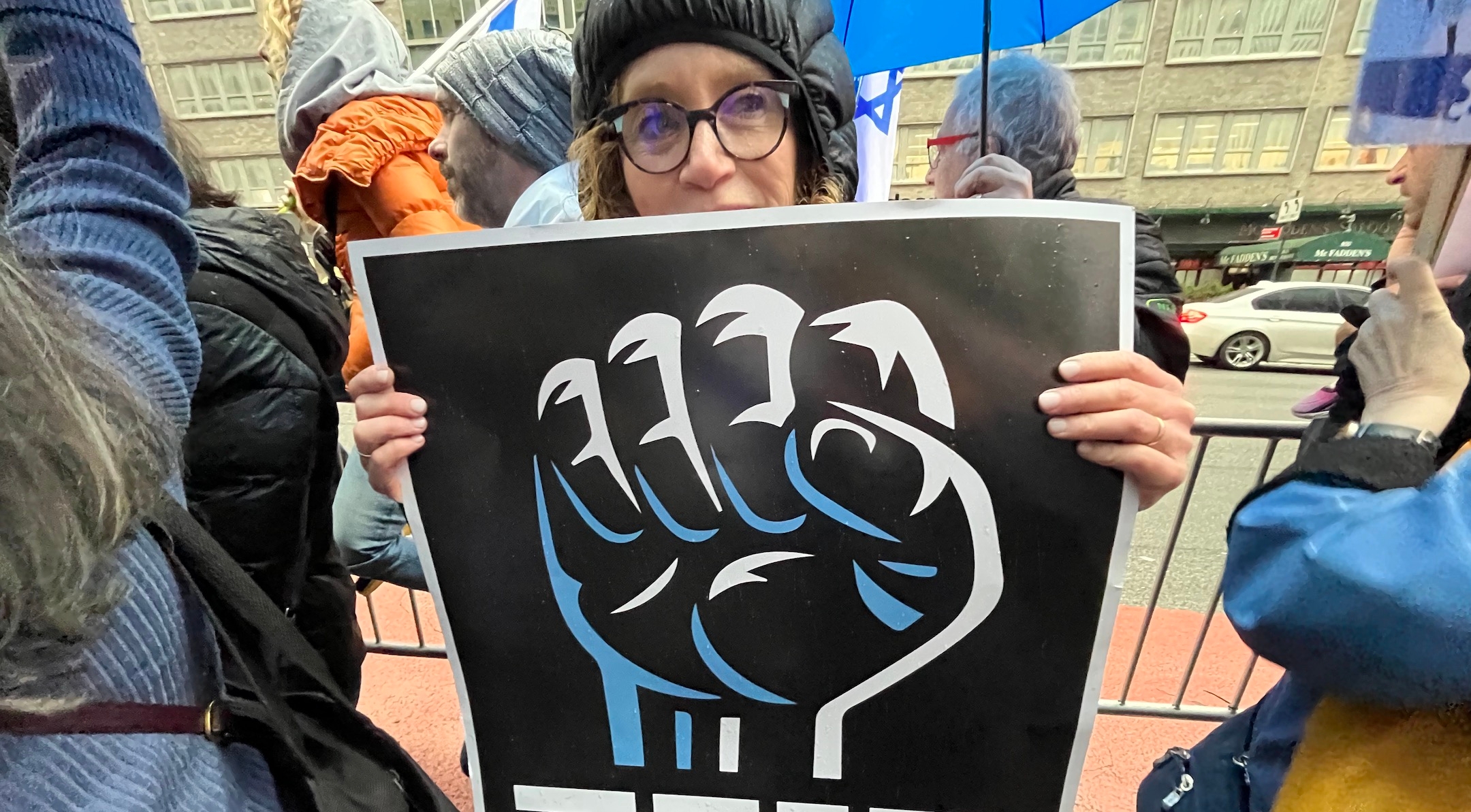
Susan Lax, the co-owner of an Israeli shoe company, holds a sign that reads “We must resist.” (Julia Gergely)
“I think that this is going to destroy Israel if we don’t come out in the streets, and my children and grandchildren will not have a country if I’m not out here,” said Susan Lax, who splits her time between the Upper West Side and Tel Aviv.
The co-owner of Naot, an Israeli shoe company, Lax feels the threat on a personal and professional level. “We are shoes of peace. It’s part of what we do,” she said.
If the reforms pass and things continue to deteriorate, “they could come and say you can’t have non-Jews working for you,” she said. “They can destroy everything that the generation above me fought for.”
American support is crucial to the cause, Lax said, whether by visiting Israel or by attending protests like these. “With no Israel, Jews have nothing in the world,” she said. “By not going there, we’re telling them ‘you’re on your own.’”
For Lax, the worst thing Israeli and American Jews could do is to give up hope, or to ease pressure on the government now that the legislation has been put on pause. She’s planning to return to Israel in a week. “Do not despair,” she said. She carried a sign reading, “We must resist.”
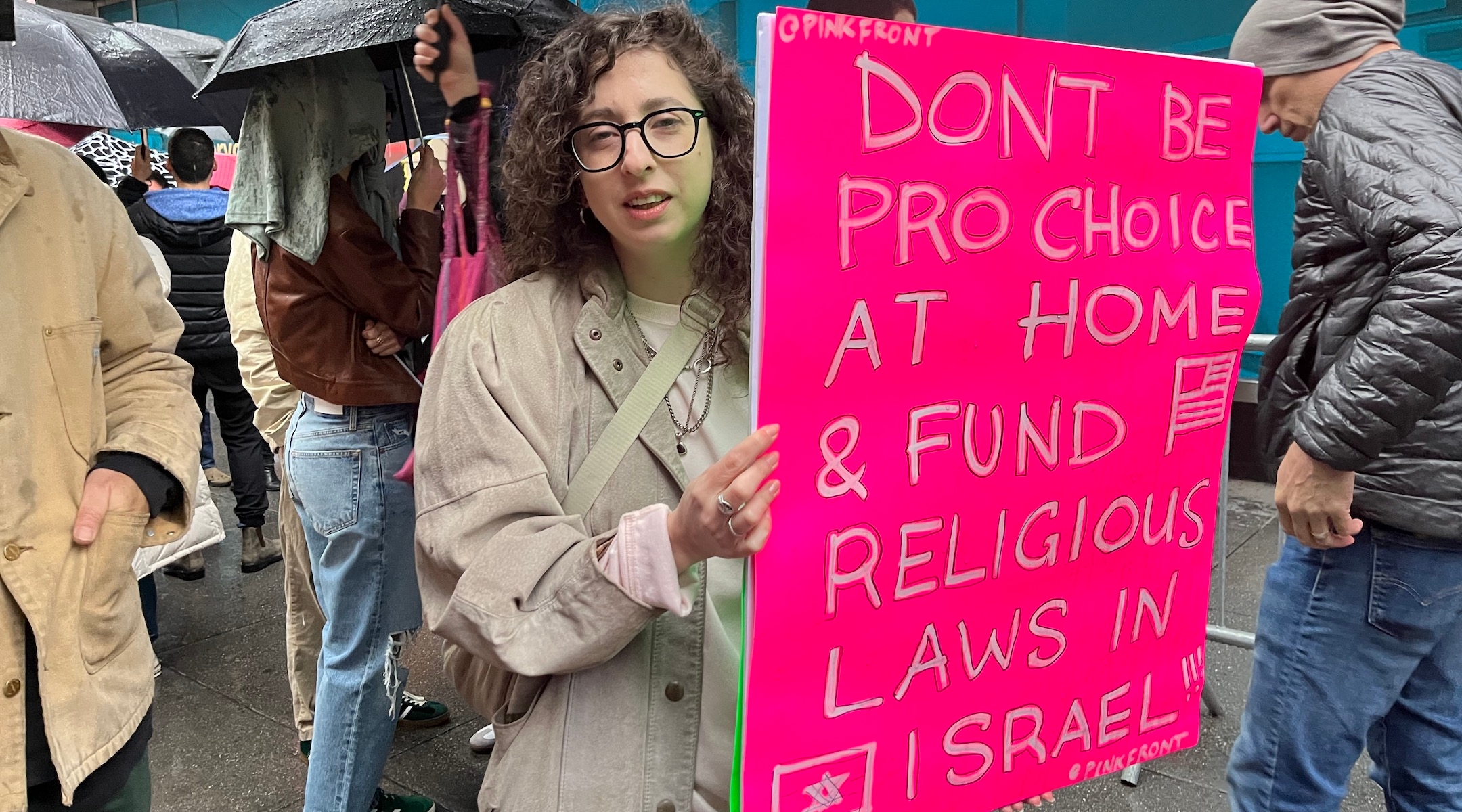
Noa is frustrated with the hypocrisy she feels coming from American Jews who support Israel despite the government’s dangerous policies. (Julia Gergely)
“A lot of American Jews are saying that it’s important to have a Jewish country so they have a refuge if something happens,” said Noa, who declined to provide her last name, and left Israel in 2014 after the Gaza War.
“But it won’t be the case soon,” she said. “Unless they act, unless they stop funding the government that is very far-right, they won’t have a refuge. They won’t have a place to go to if something happens.”
Noa criticized what she sees as the hypocrisy of American Jews, many of whom support the Israeli government no matter what. “They need to understand that next time they go to visit Israel, their wives might have to wear a head cover and men and women might be separated in many places, and maybe gay people won’t be able to live there,” she said there, presenting a worst-case scenario should haredi Orthodox parties continue to wield power in a right-wing government. “They really need to think about it and act accordingly.”
The Israeli government’s rightward shift confirmed her decision to move away, Noa said. Nonetheless, the country will always be her home. “My heart is still there,” she said. “But I don’t really see a future. It’s either dictatorship or democracy.”
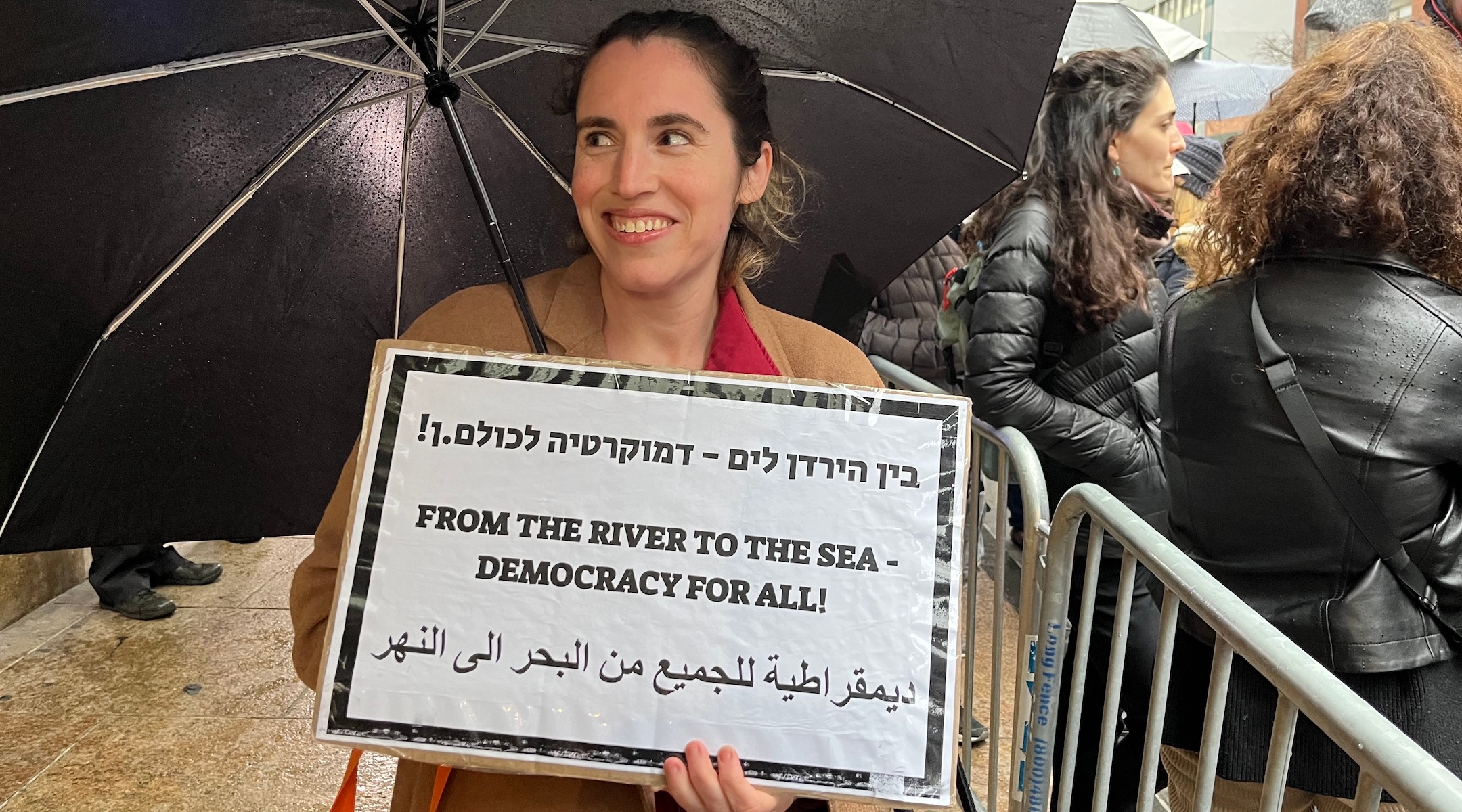
Noa Osheroff believes this is also a moment to fight for Palestinian Liberation, carrying a sign suggesting as much in Hebrew, English and Arabic. (Julia Gergely)
Noa Osheroff, an Israeli who has lived in New York for eight years, is using this moment to fight for democracy and representation for both Israelis and Palestinians.
“A group of friends and I have decided to collaborate around the protests and create a more radical group,” Osheroff said. “I always joined demonstrations and was vocal about my opinions, but I don’t work for any political organizations and I can’t even say I’m a big activist.”
In recent weeks, though, it’s become increasingly important to her to make sure that Palestinian liberation is included in the call for democracy, as well as to call out the United States government for enabling Netanyahu’s policies. The sign she carried, “From the river the sea — democracy for all,” repurposes a slogan often used by the pro-Palestinian movement to call for a single democratic state — neither Jewish nor Palestinian — in what is currently Israel and the territories. “The protests are so Zionist,” she said. “It kind of bothered me, especially in the U.S., because the U.S. funds a lot of what’s going on in the settlements. People don’t necessarily see the connection, but what’s happening now is in part a result of the occupation.”
The New York Jewish Week brings you the stories behind the headlines, keeping you connected to Jewish life in New York. Help sustain the reporting you trust by donating today.
